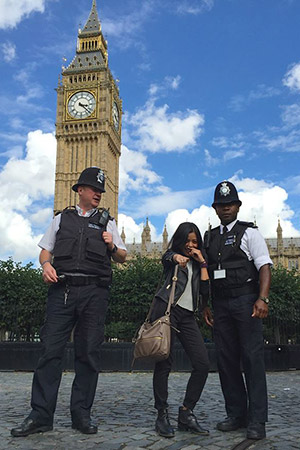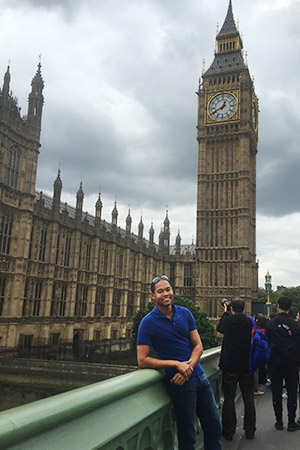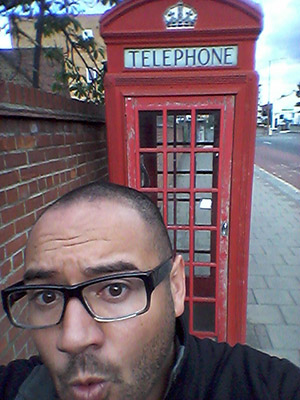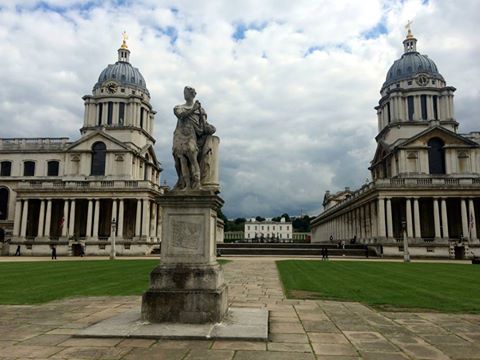For two days in late August, more than a million people inundate West London to celebrate one of the world’s largest street festivals—the Notting Hill Carnival.

Elaborate floats and colorful-costumed performers wind their way through streets to the sound of steel bands and calypso music. It’s a tribute to the traditional Afro-Caribbean carnivals of the early 19th century that celebrated the abolition of slavery.
What stood out most for UW School of Public Health student Eric King wasn’t the vibrant sounds or endless sea of people, but rather the sight of British police officers embracing and dancing with carnival-goers.
“I didn’t notice any law officials with firearms. This was different from my experience as an African-American man living in the United States,” says King, then a public health major and now a graduate student in the School’s Department of Health Services. “It speaks to the prominence of gun culture in the U.S. as well as the climate created when law officers are viewed as members of the community instead of controlling outsiders.”
King (BS, Public Health ’16) was attending a four-week exploration seminar called Dark Empire: Race, Health and Society in Britain, which examines the presence and well-being of minorities in Britain, who now make up 14 percent of the country’s 64 million residents. Students explore the social, emotional and physical determinants of health within the framework of Britain’s history and multiculturalism.
“The idea of the Dark Empire may invoke science fiction, like Star Wars,” says Tory Brundage, the program’s coordinator. “But it actually refers to the shadow that existed after the fall of the British Empire and the health disparities seen today as a result of British imperialism.”
Dark Empire is led by Dr. Clarence Spigner, professor of health services and adjunct professor of global health and American ethnic studies at the UW. Classes are based at the iconic University of Greenwich Maritime Campus, where Greenwich Mean Time is calculated.

The five-credit seminar, one of the longest running faculty-led programs at the UW, is offered through a collaboration between the School of Public Health and UW Study Abroad. It’s open to students from across campus and outside the UW. (Learn more about the program here.)
Now in its ninth year, Dark Empire derives from Dr. Spigner’s experience as a pre-doctoral fellow at London’s St. Thomas Hospital. Arriving a year after the 1981 Brixton race riots, Dr. Spigner gathered data to address the National Health Service’s potential to provide health care in a multicultural society.
The seminar embodies the same kind of experiential learning and evidence-based thinking. Students collect observational data through field trips and assessing societal behavior in public venues. They also engage in intense discussions with instructors and British experts on aspects of multiculturalism.
“We use an old-school Socratic method approach to teaching,” Brundage says. “We push students to seek out conflict, in the most respectful manner as possible, as a way of reconciling differences.”
Instructors lead students through important conversations about race, ethnicity, class and politics, in hopes that “they learn by being out of their comfort zone,” Brundage says. “A big part of the seminar is helping students to understand why the content of this course is an important perspective to have and how they can use it as an important step in problem solving.”
King explains how his understanding of racism shifted. “Prior to Dark Empire, I believed racism stemmed from slavery in the U.S., and that interpersonal, systemic and internalized racism were byproducts of U.S. history with enslavement,” he says.

The seminar introduced King to race relations in the United Kingdom. He remembers discussing hate crimes against Black men and women and attacks on immigrant neighborhoods—examples, he says, that “mirror similar experiences observed in the U.S., whether it be Ferguson, Watts or Greensboro.”
The seminar also exposed King to the diverse perspectives of fellow students who represented a myriad of cultures, countries and ethnicities. “My personal bias as an African-American makes me view racism as a black and white issue,” King says. “The course made me think more about the experiences other people face regarding their racial and ethnic identity, and it allowed me to dig deeper into the complexities and sophistication in which racism operates.”
As an MPH student, King is actively engaged in efforts on campus to improve diversity and the climate for underrepresented groups. UW President Ana Mari Cauce recently named him the graduate student representative for the new Executive Council of the University’s Population Health Initiative.
Former student Emily Kohring (BA, Public Health ’15), who traveled Europe for three months before attending Dark Empire, says navigating the environment in London was “incredibly fun and empowering.” Outside of lectures, there is “a lot of freedom to explore,” she says, “giving greater autonomy to the experience.”

Kohring adds that the assigned readings, a valuable aspect of the course, “give insight into British multiculturalism and everyday life, which complement the excursions nicely.”
Students read and discuss two prize-winning novels, Zadie Smith’s White Teeth and Monica Ali’s Brick Lane. They also submit a final report on a topic ranging from mental health, incarceration and the epidemiology of race, to James Bond, gentrification and LGBTQ issues.
About 250 students from the UW have participated in the seminar since its inception. The seminar is designed for students at all academic levels. Twenty-seven students are currently attending this year’s seminar, which began Aug. 7 and runs through Sept. 4.
“This experience is intentionally going to stretch me to think about an area I don’t usually focus on in my course work,” says Jordan Gemelas, a UW senior public health major who is currently in London for the seminar. “The seminar will help me to better cultivate a social justice perspective I think is valuable as I continue my studies in public health, and I’m going into it with a very open mind.”
To learn more about the Dark Empire seminar, visit the UW Study Abroad program website.
(By Ashlie Chandler/School of Public Health)
